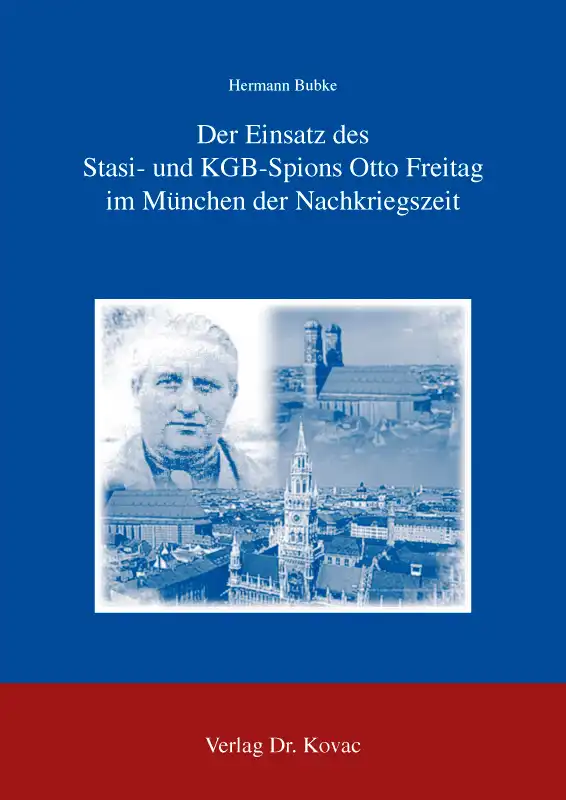Hermann BubkeDer Einsatz des Stasi- und KGB-Spions Otto Freitag im München der Nachkriegszeit
Studien zur Zeitgeschichte, volume 38
Hamburg 2004, 262 pages
ISBN 978-3-8300-1122-4 (print)
About this book deutschenglish
When the then East German Communist Party (SED) functionary, Otto Freitag, fled from the Soviet occupied zone to the West in April 1949, this caused quite a stir in Haldensleben north of Magdeburg, where he had previously lived. But nobody suspected that his flight was connected with work for the secret service. Immediately after his flight across what was still an open border between the West and the East, the former officer of the German “Wehrmacht” went to Munich where he had lived until the end of World War II. In August 1951, he began his many years of covert work as an operative for the Soviet secret service and the East German State Security Department (Ministerium für Staatssicherheit/Stasi), which was established in 1950. On behalf of both agencies and under the alias of “Hans Hausmann”, Otto Freitag infiltrated political groups which although leftwing, were anti-Stalinist. These were the German Trotskyites and the Independent Workers’ Party (Unabhängige Arbeiterpartei/UAP), which was set up in March 1951 and was independent of Moscow. Both political groups were considered to be ideologically dangerous because of their anti-Stalinist stance and their opposition to the policies of the East German government. In addition, Freitag put considerable time and effort into preparing the kidnapping of individuals, including the former assistant of Leo Trotzky, Wolfgang Salus, who died in Munich on 5 March 1953 under mysterious circumstances. The book presents new and crucial documentary evidence concerning the poisoning of Wolfgang Salus by the Stasi with the help of the KGB. In 1954, Freitag also began meticulously preparing the abduction of Reinhard Gehlen, the then head of “Organisation Gehlen”, which was the forerunner to the BND, the German secret service. The plan was to kidnap him in his home south of Munich and to smuggle him to Soviet territory. Following an order from a higher authority, probably the Soviet government, the operation was cancelled in September 1955 just before it was about to be carried out. In the late 1950s, Freitag planned the kidnapping of Borys Lewytzkyj, an Ukrainian emigrant and publicist, who lived in Munich. This plan was also not carried out, however, as Freitag was recalled. After deploying him as a secret agent for ten years, the Stasi staged Otto Freitag’s recall from his West German operation area as a “flight” from Munich to East Berlin, where he appeared at a press conference which was used for propaganda purposes. After that, Freitag worked in East Berlin as a “Stasi officer in special deployment” (Offizier im besonderen Einsatz/OibE) and as a Stasi travel courier providing undercover surveillance of individuals regarded as politically suspect. This book illustrates Freitag’s life as a spy and secret service agent as well as the contemporary history which is closely linked to it. The report demonstrates the activities of the Soviet and East German secret services in both German states after World War II.Keywords
DDRGeheimdienstGeheimer MitarbeiterGeschichtswissenschaftKGBNachkriegszeitSEDSowjetischer GeheimdienstStaatssicherheitsdienstStalinismusTrotzkismusUnabhängige Arbeiterpartei Deutschlands UAPZeitgeschichteIhr Werk im Verlag Dr. Kovač

Möchten Sie Ihre wissenschaftliche Arbeit publizieren? Erfahren Sie mehr über unsere günstigen Konditionen und unseren Service für Autorinnen und Autoren.
